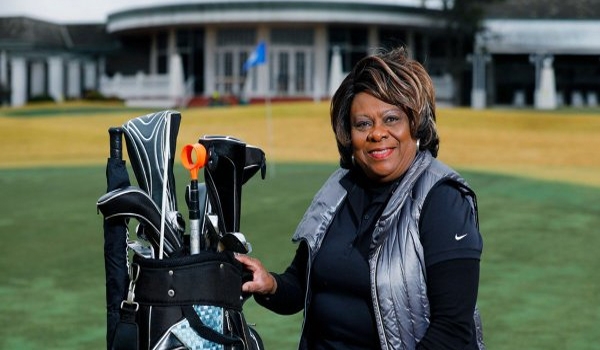
Gladys Lee, LPGA Class A teaching professional and North Texas golf instructor loves golf with a passion. (photo: Dallas News)
December 18, 2018
There’s a catch in her voice when North Texas golf instructor Gladys Lee talks about trying to find a teaching position at local country clubs, beginning in the 1980s.
After getting her Class A teaching credentials from the LPGA in 2012, Lee applied for work at eight local clubs. Actually, it was nine. No, 10. Nothing happened.
“They would say they didn’t need help,” she said. “You would go back later and see new people.
“I love golf with a passion,” she said, the emotion coming through in her voice. “But it’s hard when it comes to making a living in it … as a minority. It’s not the easiest thing in the world to make a living when it comes to us.”
The PGA of America, which announced last week that it was moving to Frisco, says it wants to “look more like the nation” — meaning more diverse.
Yet nearly six decades after the group removed the “Caucasian-only” clause from its bylaws, its membership remains stubbornly monochromatic. It’s 91 percent white and nearly 96 percent male.
In North Texas, the group will continue its efforts to boost diversity — in its ranks, among its suppliers and across the sport. Golf experts see it as a matter of self-preservation.
“With all the reports of a browning, so to speak, and females in America, I don’t know why any industry would not want to align itself with that changing face of the nation,” said Michael Cooper, chairman of a diversity task force launched by the World Golf Foundation, which promotes golf.
“For any industry that’s trying to stay productive and … to be frank, make money, why would you not want to avail yourself of that same changing demographic of America? It doesn’t make sense economically.”
RELATED STORY: LPGA Golf 101 & LPGA-USGA Girls Graduate with Flair with the help of Gladys Lee
Founded in 1916, the PGA of America is one of the largest golf organizations in the nation. Its 29,000 members and those seeking membership are largely professionals who make their living from the sport, from instructors and coaches to administrators and course managers. It is separate from the PGA Tour, a membership group of professional golfers that puts on more than 120 official tournaments.
PGA of America officials tick off a list of recent diversity-related accomplishments, beginning with the election last month of the group’s first woman president — Suzy Whaley, who owns Suzy Whaley Golf in Cromwell, Conn., and is the PGA director of instruction at the Country Club of Mirasol in Palm Beach Gardens, Fla.
“I would tell you,” she told The Dallas Morning News last week when asked to describe the makeup of her group, “it’s heavily and predominantly currently white male.”
As chair of the PGA’s board of directors, Whaley will help oversee the organization’s strategy for the next two years and help chart the future of the sport.
“Our goal in diversity and inclusion is really to evolve the game, to evolve our workforce and to really evolve our supply chains to mirror our community,” she said. “Certainly we have put programming in place over the course of the last 10 years to grow the base that we have.”
Some of the PGA’s efforts involve attracting more women.
The agreement that will bring the association’s headquarters to North Texas in 2022 calls for two PGA Championships, two KPMG Women’s PGA Championships and potentially a Ryder Cup to be held in Frisco.
The first women’s championship is set for 2025, three years after the scheduled opening of the 600-acre development that will include an Omni resort and a 127,000-square-foot conference center.
“I’m excited to have that in Frisco,” Whaley said of the women’s tournaments. “It also includes a women’s leadership summit, which has become one of the most powerful summits in the country for women leaders to inspire greatness amongst women [who] are not only in corporate America but also play the game of golf … and to help elevate them into the C-suite. We’ll be able to do that right in Frisco.”
The group also has high hopes for its PGA Jr. League, a program largely for players 13 and younger.
This year, more than 50,000 boys and girls, a record, participated on 4,200 PGA Jr. League teams. At least 15 percent come from diverse backgrounds, and about 25 percent were young girls, the association said.
“Those numbers aren’t where we would like them to be,” Whaley said. “We certainly want [female participation] to be at least 50 percent. We’re excited about the growth of PGA Jr. League.
“And we’re thrilled to bring that to the Dallas area and the surrounding areas.”
Read more by Karen Robinson-Jacobs at DallasNews.com



